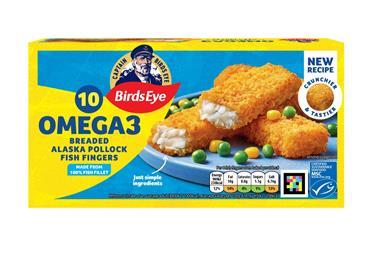The drive to raise the profile of sustainably sourced fish on supermarket shelves and in consumers’ diets is intensifying with Unilever’s decision to roll out Marine Stewardship Council-certified pollock across Europe in the next six months.
The company is hoping that the major volume Alaskan pollock fisheries, which are now certified, will provide a popular source of sustainable white fish.
Unilever had touted New Zealand hoki as an alternative to cod, but withdrew Birds Eye lines from the UK.
Young’s Bluecrest, however, retains its Fish for Life hoki fillets, and own-label MSC hoki is still stocked by Sainsbury and Asda.
MSC chief executive Rupert Howes hailed Unilever’s
decision to roll out MSC-certified pollock, beginning in Germany, with a huge marketing drive this year. He was also encouraged by the likely approaching certification of the Pacific cod fishery (Bering Sea and Aleutian Islands), which would bring sustainable wild
cod on to the market for the first time. And he hoped the North Sea herring fishery would also sign up fully to the MSC label.
Howes added that there were lessons to be learned from the way hoki had been promoted as a subsitute for cod, and a higher price point had also not helped. “Promoting it as an alternative may have given the sense that it was inferior. It may also simply not have suited the UK palate.”
Howes said MSC-certified lines had now grown to 270, supplied to 24 countries. “There is tremendous momentum. More and more fisheries are coming forward - 19 are undergoing assessment, and 5% of the total wild catch is now either certified or in the assessment process.”
Helen Lo, head of CSR and sustainability at Unilever Ice Cream and Frozen Food, said the multinational aimed to make pollock a quality species as opposed to a generic ‘white fish’ in the UK. New products would be based on market research, but would be likely to start with pollock as an ingredient, rather than whole pieces.
Kit Davies
The company is hoping that the major volume Alaskan pollock fisheries, which are now certified, will provide a popular source of sustainable white fish.
Unilever had touted New Zealand hoki as an alternative to cod, but withdrew Birds Eye lines from the UK.
Young’s Bluecrest, however, retains its Fish for Life hoki fillets, and own-label MSC hoki is still stocked by Sainsbury and Asda.
MSC chief executive Rupert Howes hailed Unilever’s
decision to roll out MSC-certified pollock, beginning in Germany, with a huge marketing drive this year. He was also encouraged by the likely approaching certification of the Pacific cod fishery (Bering Sea and Aleutian Islands), which would bring sustainable wild
cod on to the market for the first time. And he hoped the North Sea herring fishery would also sign up fully to the MSC label.
Howes added that there were lessons to be learned from the way hoki had been promoted as a subsitute for cod, and a higher price point had also not helped. “Promoting it as an alternative may have given the sense that it was inferior. It may also simply not have suited the UK palate.”
Howes said MSC-certified lines had now grown to 270, supplied to 24 countries. “There is tremendous momentum. More and more fisheries are coming forward - 19 are undergoing assessment, and 5% of the total wild catch is now either certified or in the assessment process.”
Helen Lo, head of CSR and sustainability at Unilever Ice Cream and Frozen Food, said the multinational aimed to make pollock a quality species as opposed to a generic ‘white fish’ in the UK. New products would be based on market research, but would be likely to start with pollock as an ingredient, rather than whole pieces.
Kit Davies















No comments yet